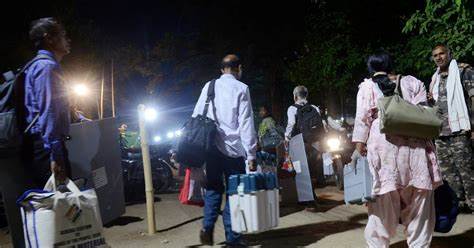Tripura is poised to hold Panchayat polls by the end of July, as confirmed by official sources. The announcement comes as a beacon of hope for democratic governance at the grassroots level, offering citizens the opportunity to elect their representatives and participate in shaping the socio-economic development of their communities. With preparations underway and political fervor building up, the upcoming Panchayat elections herald a new chapter in Tripura’s democratic journey.
Panchayat elections, often referred to as the cornerstone of rural democracy, hold immense significance in India’s political landscape. They provide a platform for ordinary citizens to engage in the democratic process, exercise their franchise, and elect representatives who will address their needs and aspirations at the local level. In Tripura, where the Panchayati Raj system plays a crucial role in decentralized governance, the forthcoming polls offer an opportunity to strengthen grassroots democracy and promote inclusive development.
The decision to hold Panchayat polls in Tripura comes after a period of anticipation and deliberation, with authorities taking into account various factors, including the prevailing COVID-19 situation and logistical considerations. Despite challenges posed by the pandemic, the commitment to upholding democratic principles and ensuring the continuity of democratic processes remains unwavering, underscoring the resilience of Tripura’s democratic institutions.
As preparations for the Panchayat elections gather momentum, political parties and aspirants are gearing up for spirited campaigns aimed at wooing voters and garnering support for their respective agendas. The electoral battleground is set to witness intense competition as candidates vie for seats at the village, intermediate, and district Panchayat levels, presenting voters with a diverse array of choices and visions for local governance.
For citizens, the Panchayat elections represent an opportunity to voice their concerns, articulate their priorities, and hold elected representatives accountable for their actions and decisions. Issues ranging from rural development, infrastructure, healthcare, education, and livelihoods are expected to dominate the electoral discourse, reflecting the aspirations and challenges faced by communities across Tripura.
Moreover, the Panchayat elections serve as a litmus test for political parties and leaders, offering them insights into public sentiment and preferences at the grassroots level. The outcomes of the elections are likely to influence political dynamics not only in Tripura but also at the state and national levels, shaping policy priorities, coalition dynamics, and governance agendas.
In the lead-up to the elections, the Election Commission and other relevant authorities are leaving no stone unturned to ensure the smooth conduct of polls while adhering to COVID-19 protocols and guidelines. Measures such as voter awareness campaigns, training for polling officials, and sanitization protocols at polling stations are being implemented to safeguard the health and safety of voters and election personnel.
Furthermore, efforts are underway to enhance transparency, integrity, and accountability in the electoral process, including measures to prevent malpractices such as vote-buying, intimidation, and electoral fraud. The Election Commission’s commitment to conducting free, fair, and transparent elections is paramount, as it fosters public trust and confidence in the electoral process and strengthens the foundations of democracy.
Beyond the electoral arena, the Panchayat elections hold the promise of catalyzing grassroots development and empowering local communities to participate actively in governance and decision-making processes. Elected representatives, once in office, have the responsibility to prioritize the welfare of their constituents, promote inclusive development, and foster participatory governance mechanisms that amplify the voices of marginalized and vulnerable groups.
In addition, the upcoming Panchayat elections in Tripura herald a democratic milestone, offering citizens the opportunity to exercise their franchise and shape the future of their communities. As the electoral process unfolds, it is imperative for all stakeholders, including political parties, candidates, election authorities, and citizens, to uphold the principles of democracy, ensure peaceful conduct, and respect the verdict of the electorate. By embracing the spirit of democracy and civic engagement, Tripura can chart a path towards inclusive and sustainable development that leaves no community or individual behind.




